Whether you're a casual jogger, a dedicated gym-goer, or someone just looking to keep up with your daily step count, choosing the right fitness app can be nearly as important as lacing up your sneakers. With countless options flooding the market, sorting through the sea of choices can feel overwhelming. But don't worry — we’ve done the heavy lifting for you. After some research, testing and analysis; we've curated a list of the top fitness apps that will turn your phone into your ultimate workout partner. Let’s explore which app will help you reach your fitness goals.
Everything We Recommend
| App | Summary | Better Products Score |
|---|---|---|
| Fitbit | Best Overall and for most people. | 4.7 |
| Strava | Best for outdoor enthusiasts and community. | 4.6 |
| Oura Ring | Best for sleep tracking. | 4.5 |
| WHOOP | Best for advanced fitness & health monitoring. | 4.4 |
| Samsung Health | Best for Samsung ecosystem. | 4.1 |
| Google Fit | Best for Android & Wear OS. | 4.0 |
| Apple Health | Best for Apple ecosystem. | 4.0 |
What We Look For
Features and Functionality
- Activity Tracking: Ability to monitor various activities such as running, cycling, and swimming.
- Health Monitoring: Features for tracking heart rate, sleep patterns, and similar metrics.
- Workout Plans: Able to set and follow personalized workout plans.
- Goal Setting: Can set, track, and achieve fitness goals.
User Interface and Experience (UI/UX)
- Ease of Use: An intuitive interface that makes fitness tracking straightforward.
- Customization: Tools that allow you to personalize features to fit your specific goals.
Integration and Syncing
- Device Compatibility: Seamless integration with your smartwatch or other devices.
- Real-Time Syncing: Ability to sync your data in real-time across devices.
Reports and Analytics
- Detailed Reports: Features that offer detailed reports on your fitness activities.
- Performance Insights: Analytics on your performance that helps identify areas for improvement.
Security
- Data Encryption: Strong encryption to protect your data.
- Two-Factor Authentication: Additional security measures like 2FA.
Customer Support and Updates
- Support Availability: Access to customer support through chat or other channels.
- Regular Updates: Frequent updates to improve functionality and fix bugs.
Compatibility
- Platform Availability: Available on your preferred platforms.
- Cross-Device Sync: Ability to sync your data across multiple devices.
User Reviews and Reputation
- User Feedback: Feedback from other users to help gauge the quality.
- Expert Reviews: Ratings from reputable sources and fitness experts.
Additional Features
- Social Sharing: Can share your progress and achievements on social media.
- Community Support: A dedicated community for motivation and support.
- Nutritional Tracking: Tool to track your nutrition alongside your fitness.
Cost
- Pricing Models: Free version, a one-time purchase, or a subscription model.
- Hardware Requirements: Some apps are designed primarily to work with their own proprietary hardware, limiting the value to customers who don't have the corresponding watch, ring, or bracelet.
Fitbit App Review
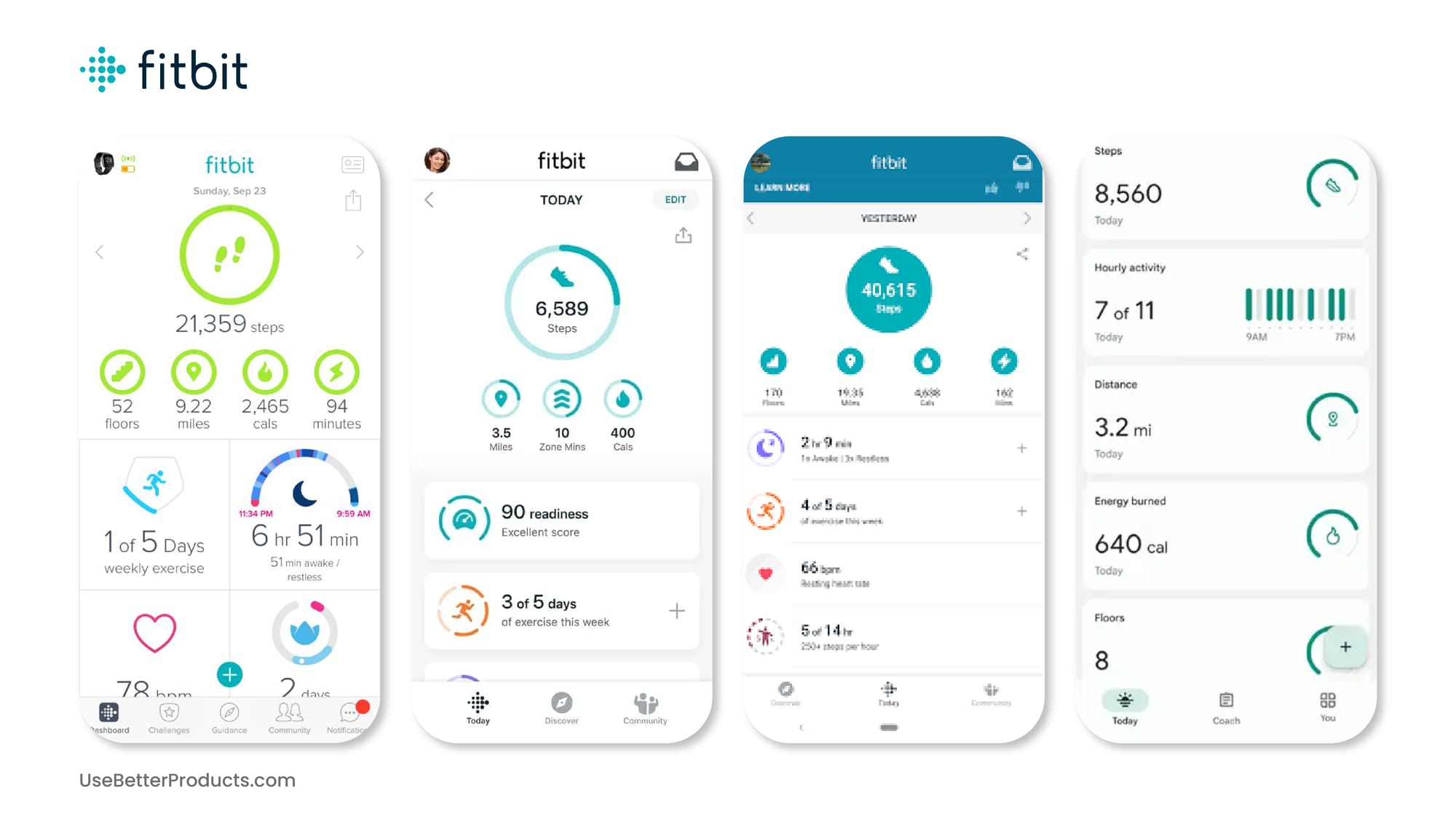
The Fitbit app serves as a comprehensive hub for all your wellness data. As the companion to Fitbit's range of wearable devices—now under Google's umbrella since 2021—the app aggregates information on your daily activity, heart rate, sleep patterns, and calorie consumption into an accessible and user-friendly interface.
Designed for a broad audience that includes casual users as well as fitness enthusiasts, the Fitbit app allows you to set personalized goals, log workouts, and track nutritional intake. It also offers social features like community challenges to keep you motivated. By syncing with other health and fitness apps, or entering data manually, the Fitbit app provides a holistic view of your well-being, helping you make informed decisions about your health habits.
Pros
Holistic Health Tracking Platform:
- Holistic Metrics: Fitbit devices track a wide range of health metrics, including steps, distance, calories burned, heart rate, and sleep quality, giving you a complete picture of your fitness and health.
- Advanced Features: Features like guided breathing sessions and sleep analysis help you manage stress and improve sleep habits.
User-Friendly Interface:
- Ease of Use: Fitbit is known for its intuitive interfaces, making fitness tracking straightforward.
- Personalization: Customizable dashboards allow you to tailor your experience to your specific goals.
Versatile Product Range:
- Variety of Devices: From basic fitness bands to advanced smartwatches, Fitbit offers products to suit various needs and budgets.
- Design Options: Multiple design options and accessories cater to different styles.
Strong Community Features:
- Social Engagement: The Fitbit app includes social features such as challenges, leaderboards, and community groups, fostering a sense of community among users.
- Group Challenges: Participating in group challenges can help keep you motivated in your fitness journey.
Integration with Other Apps:
- Seamless Syncing: Fitbit integrates seamlessly with numerous health and fitness apps, allowing you to consolidate your health data in one place.
- Data Sharing: Easy data sharing with other apps enhances the overall functionality of Fitbit devices.
Cons
Subscription Costs:
- Premium Features: Access to advanced health insights often requires a Fitbit Premium subscription.
- Free Version Limitations: Compared to the premium version, the free version feels limited.
Battery Life:
- Frequent Charging: Feature-rich models, especially smartwatches, may require frequent charging.
- Battery Variation: Battery life can vary significantly between different models.
Accuracy Issues:
- High-Intensity Workouts: Reports of occasional inaccuracies in tracking metrics like heart rate during high-intensity workouts.
- Sleep Tracking: Sleep stage tracking may not always be perfectly accurate.
Compatibility Limitations:
- Device Connectivity: While generally compatible with most devices, you may experience connectivity issues with certain operating systems.
- Platform Specifics: Some features may be more optimized for certain platforms over others.
Price Point:
- Costly Models: Fitbit’s advanced models can be relatively expensive compared to other fitness trackers on the market.
- Initial Investment: The initial cost for higher-end models might be a barrier.
Price
Subscription Costs:
- Fitbit Premium: To unlock the full potential of Fitbit’s features, you can subscribe to Fitbit Premium, which costs around $9.99 per month or $79.99 per year.
- Free vs. Paid Features: The free version of the Fitbit app offers basic tracking and insights. A premium subscription unlocks in-depth analytics, personalized guidance, and additional content.
Fitbit stands out as a top contender in the fitness tracking market due to its many health-tracking features, user-friendly interface, and great community engagement. The variety of devices offered caters to a wide range of people, from casual fitness enthusiasts to dedicated athletes.
On the other hand, the ongoing costs of Fitbit Premium may be a consideration if you’re budget-conscious. Additionally, some metrics may occasionally show discrepancies. Despite these minor drawbacks, Fitbit's strong feature set, coupled with its motivational community features, makes it a valuable choice for anyone looking to enhance their fitness journey.
Strava App Review
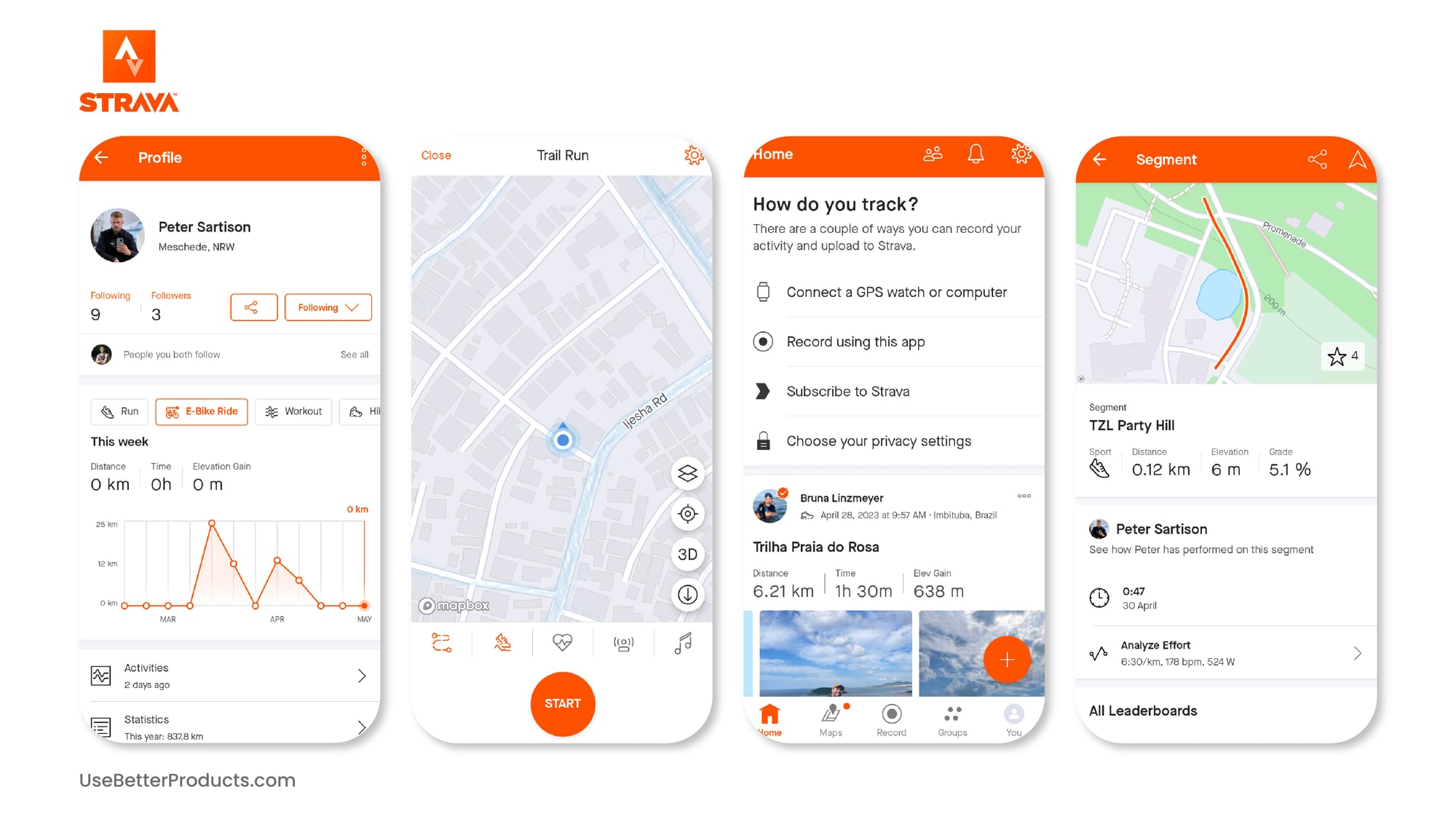
Founded in 2009, Strava has carved out a niche as the go-to app for runners, cyclists, and outdoor enthusiasts seeking both performance tracking and community engagement. Strava offers detailed activity tracking, segment analysis, and social networking features, making it a favorite among athletes and recreational users alike.
The Strava Summit subscription unlocks advanced features like personalized training plans, in-depth performance analytics, and safety tools such as Beacon, which shares your real-time location. Strava's unique segment feature allows you to compete on specific stretches of road or trail, fostering a sense of community and friendly competition. With its supportive community, Strava connects you with other like-minded individuals.
Pros
Holistic Activity Tracking:
- Detailed Metrics: Strava records various data, including distance, pace, elevation, and calories burned.
- Segment Analysis: The segment feature enables you to challenge yourself on specific trails, infusing regular workouts with a competitive spirit.
Community and Social Features:
- Social Networking: Strava’s social features allow you to connect, join clubs, and participate in challenges, fostering a strong sense of community.
- Challenges and Competitions: Regularly hosted challenges and competitions keep you motivated to achieve your fitness goals.
Advanced Features for Subscribers:
- Strava Summit: Unlocks advanced features like personalized training plans, in-depth performance analytics, and safety tools such as Beacon.
- Route Planning: Subscribers have access to advanced route planning tools, helping them discover new paths and trails.
Integration and Compatibility:
- Device Integration: Strava integrates seamlessly with a range of fitness apps and devices, allowing you to combine your health data.
Cons
Subscription Costs:
- Paid Features: Access to many of Strava’s advanced features requires a Strava Summit subscription.
- Free Version Limitations: The free version of Strava lacks the depth and advanced tools available to subscribers.
Privacy Concerns:
- Data Sharing: The social nature of Strava means that you need to be mindful to avoid sharing sensitive location data unintentionally.
- Public Segments: Public segment competitions can sometimes lead to privacy issues, as these segments are visible to all users.
Battery Usage:
- High Battery Consumption: Continuous GPS tracking can drain the battery quickly, which can be inconvenient for long workouts.
Complexity for Beginners:
- Steep Learning Curve: The extensive features and data provided by Strava can be overwhelming for newbies.
Price
Free Version:
- Basic Features: The free version includes essential features like activity tracking, basic metrics, and access to the social network.
Strava Summit Subscription:
- Monthly and Annual Plans: Strava Summit subscription cost is $8 per month or $60 per year.
- Advanced Features: The subscription unlocks a suite of advanced tools, ranging from personalized training plans to safety features like Beacon.
Strava stands out as a premier fitness-tracking app for runners, cyclists, and outdoor enthusiasts, blending well-rounded activity tracking with a vibrant social network. Its detailed metrics, segment analysis, and community challenges foster a competitive and motivational environment that keeps you engaged and striving for your fitness goals.
Nonetheless, the reliance on a subscription model for accessing advanced features and potential privacy concerns may deter some users. Nonetheless, Strava's combination of robust tracking capabilities and social interaction makes it an exceptional choice when you’re seeking both performance insights and community support in your fitness journey.
Oura Ring App Review
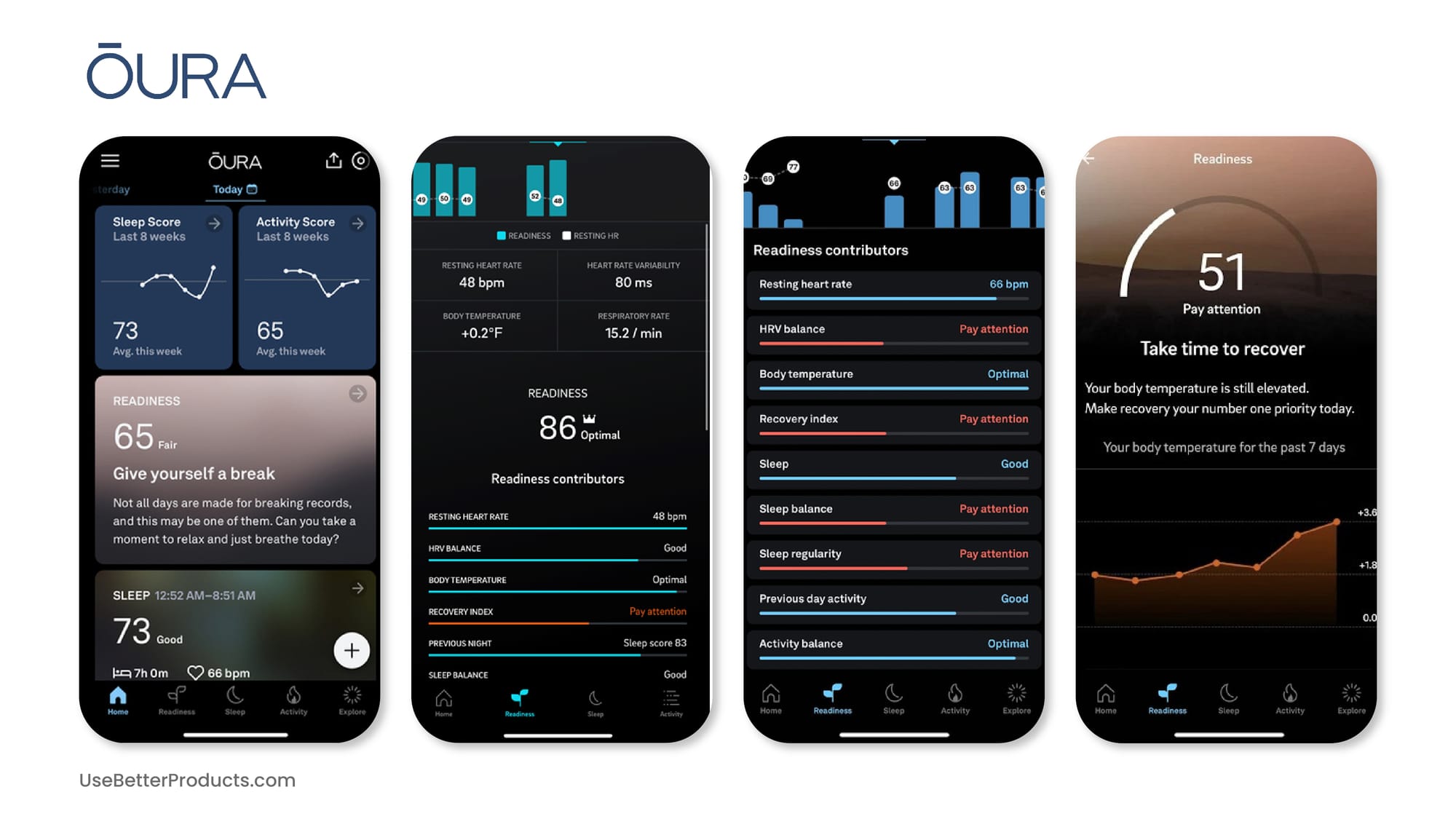
If you're looking to take your health monitoring to the next level, the Oura app—used exclusively with the Oura Ring—offers a comprehensive glimpse into your well-being. Developed by the Finnish company Oura, this app-ring duo specializes in tracking sleep quality, recovery, and daily activity to provide a holistic view of your health. The Oura Ring is a sleek, minimalist piece of hardware worn on your finger, equipped with advanced sensors that monitor metrics like heart rate variability, body temperature, and sleep stages.
Designed for health-conscious individuals who prefer a discreet wearable, the Oura app translates the ring's data into actionable insights - without the distraction of a screen. It delivers personalized scores for sleep, readiness, and activity levels, helping you make informed decisions about your rest and exercise routines. It's important to note that the app's functionality is entirely dependent on owning the Oura Ring hardware; without it, the app cannot provide any data or insights. If you're ready to invest in a seamless integration of stylish hardware and insightful software, the Oura app offers a unique and in-depth approach to understanding and improving your health.
Pros
Advanced Health Metrics:
- Detailed Tracking: The Oura Ring monitors a range of health metrics, offering a holistic view of your health.
- Sleep Focus: Exceptional sleep tracking capabilities provide insights into sleep stages, sleep quality, and overall restfulness.
Discreet Design:
- Unobtrusive Wearable: The Oura Ring is sleek and discreet, making it comfortable to wear all day and night without interference.
- Stylish Appearance: The ring’s elegant design makes it a stylish accessory that can be worn with any outfit.
Long Battery Life:
- Extended Usage: The Oura Ring boasts a battery life of up to seven days, reducing the need for frequent charging.
User-Friendly App:
- Intuitive Interface: The Oura app is well-designed, providing clear and actionable insights into your health data.
- Personalized Insights: Personalized recommendations help you optimize your sleep, recovery, and overall well-being.
Cons
Price Point:
- High Cost: The Oura Ring is relatively expensive, with prices starting around $299.
Limited Activity Tracking:
- Basic Activity Metrics: While excellent for sleep and recovery, the Oura Ring offers basic activity tracking compared to other fitness trackers.
- No Built-In Display: The absence of a built-in display means you must rely on the app to view your data.
Size and Fit:
- Sizing Concerns: Proper sizing is crucial for accurate data. You must ensure you get the correct size for optimal results.
Price
Initial Cost:
- Base Price: The Oura Ring is positioned in the premium segment of the fitness tracking market, with prices starting around $299.
- Premium Models: Higher-end models with additional features or luxury finishes can cost upwards of $399.
Subscription Costs:
- Oura Membership: To unlock the full potential of the Oura Ring’s insights and advanced analytics, you can subscribe to the Oura Membership for $5.99 per month.
The Oura app provides a comprehensive and user-friendly platform for individuals seeking to delve deeper into their health and wellness. Focusing on key areas like sleep quality, recovery, and daily activity, the app translates complex biometric data into intuitive insights and personalized guidance. Its sleek interface makes it easy to navigate through detailed reports and trends, empowering users to make informed decisions about their lifestyle and routines.
The real strength of the Oura app lies in its ability to present actionable information that can lead to meaningful improvements in well-being. By offering tailored recommendations and tracking progress over time, it serves as a valuable tool for anyone committed to enhancing their health through data-driven strategies. If you're looking to gain a holistic understanding of your body's signals and optimize your daily habits accordingly, the Oura app stands out as a compelling choice.
WHOOP App Review
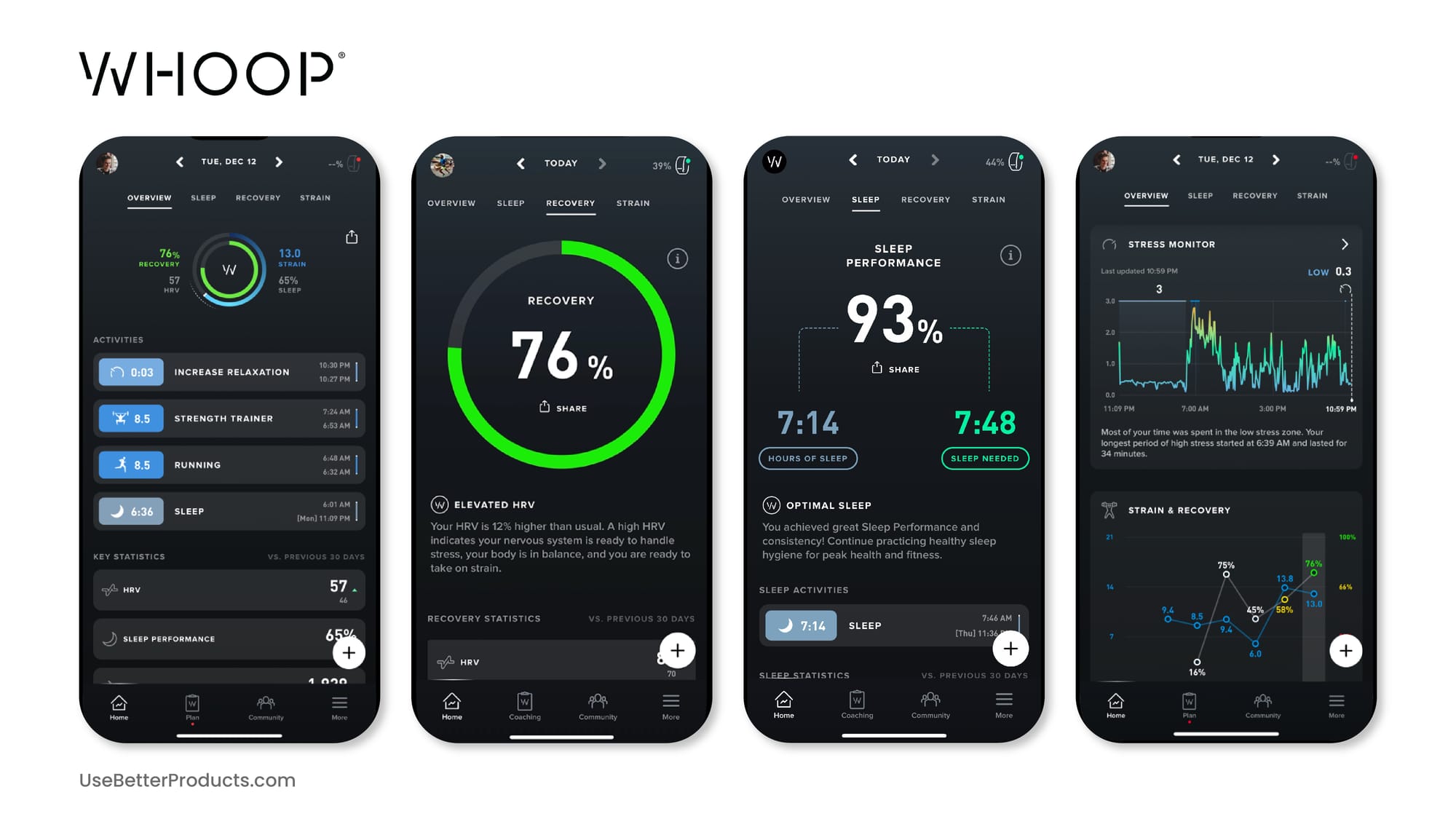
WHOOP, a leader in performance optimization, offers a unique approach to fitness tracking by focusing on recovery, strain, and sleep. Designed for serious athletes and fitness enthusiasts, WHOOP differentiates itself with a sleek, strap-based device that collects continuous physiological data. The WHOOP app also provides in-depth insights to help you optimize your training and recovery routines.
Key product offerings include the WHOOP band, which has advanced sensors to monitor metrics like heart rate variability, resting heart rate, and sleep performance. Unlike other fitness trackers, WHOOP emphasizes the importance of recovery, guiding you on how to balance strain and rest for peak performance. If you’re serious about improving your body's performance, WHOOP stands out as a top contender.
Pros
Advanced Health Metrics:
- In-Depth Tracking: WHOOP provides detailed monitoring of heart rate variability, resting heart rate, sleep stages, and recovery metrics.
- Focus on Recovery: Unique emphasis on recovery helps you balance training and rest, reducing the risk of injury.
Personalized Insights:
- Tailored Recommendations: Personalized insights help you make informed decisions about training and recovery.
- Actionable Data: Daily reports provide actionable data, enabling you to adjust your routines for better results.
Continuous Monitoring:
- 24/7 Data Collection: WHOOP bands collect data continuously, ensuring no gaps in your activity and recovery tracking.
- No Need for Manual Input: Automatic data collection means you don’t have to manually log activities.
Community and Team Features:
- Group Analytics: WHOOP offers group features where you can share data and compete, fostering motivation and support.
- Performance Comparisons: The ability to compare performance and recovery metrics with teammates adds a competitive edge.
Cons
Subscription Costs:
- Monthly Fee: WHOOP operates on a subscription model, which is necessary to access the app’s full suite of features, making it a recurring expense.
Device Limitations:
- Limited Display: The WHOOP Band doesn’t have a display, meaning you must rely on the app for insights.
- No On-Device Feedback: Immediate feedback on metrics isn’t available directly on the device.
Niche Market:
- Target Audience: WHOOP is primarily designed for serious athletes and those deeply invested in performance optimization, which may not appeal to casual users.
- Complexity of Data: The detailed insights might be overwhelming if you’re unfamiliar with advanced fitness metrics.
Price
Subscription Model:
- Monthly Fee: WHOOP operates on a subscription basis, costing around $30 per month. This subscription covers the WHOOP Band and access to the many features of the app.
- Annual Plans: WHOOP also offers discounted rates for longer commitments, such as $288 for a 12-month plan.
WHOOP offers a specialized approach to fitness tracking that is particularly appealing to serious athletes and fitness enthusiasts. Its focus on recovery, strain, and sleep provides a well-rounded understanding of your body’s performance, making it a valuable tool for optimizing training and preventing injury.
However, the subscription-based model and the absence of a display on the device may be deterrents. The recurring cost can add up over time, making it a more significant investment compared to other fitness trackers. Nevertheless, if you’re committed to deeply understanding and enhancing your athletic performance, WHOOP offers a unique approach that stands out in the crowded fitness tracking market.
Samsung Health App Review
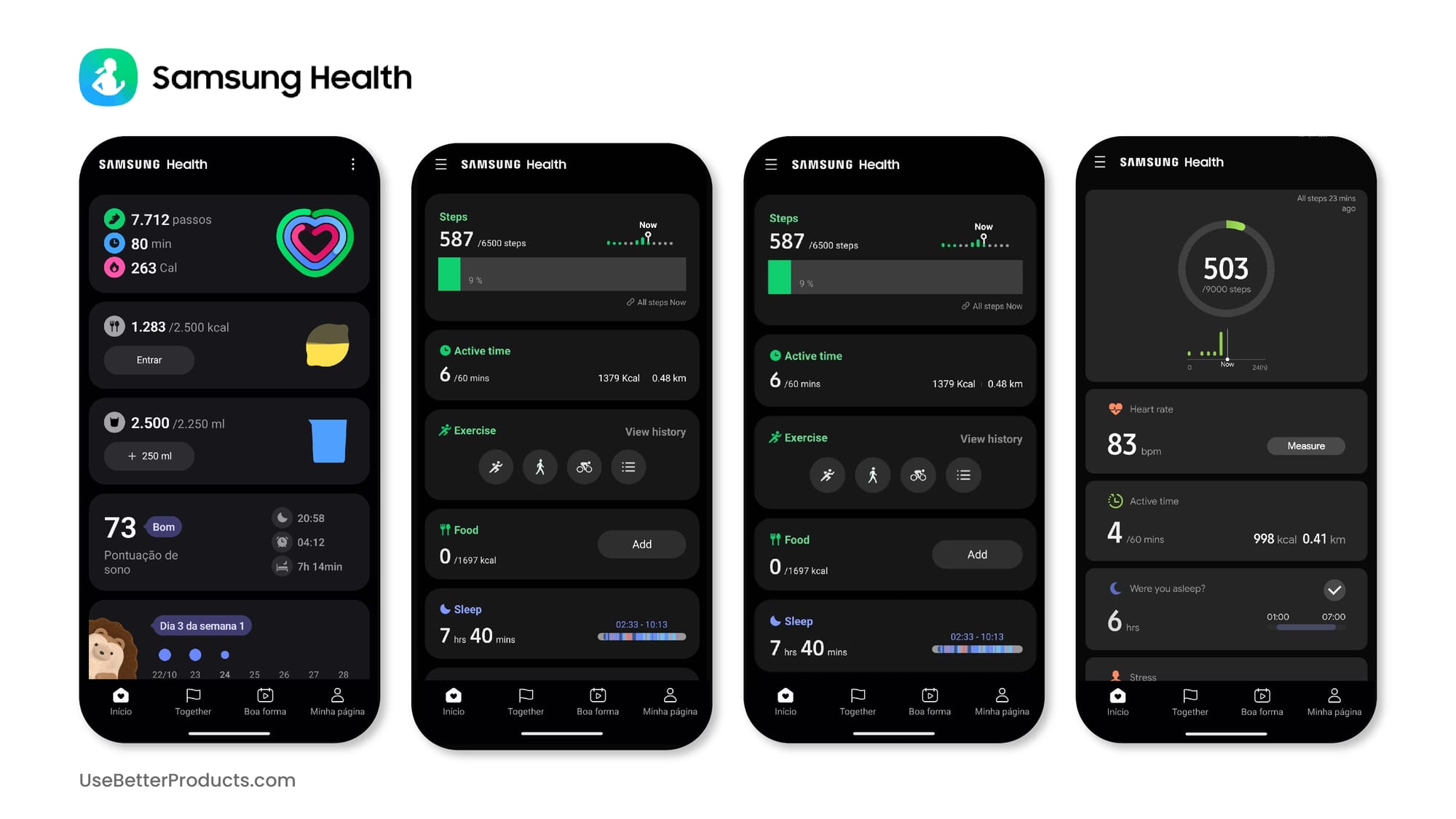
Samsung Health is a versatile health and fitness app from Samsung. It offers a suite of features that cater to both beginners and seasoned athletes. Designed to integrate with Samsung’s ecosystem of devices, Samsung Health tracks a wide range of health metrics, including steps, heart rate, sleep patterns, and stress levels. It also supports various activities, from running to more niche exercises like yoga, making it a well-rounded choice.
Key product offerings include personalized workout plans, nutrition tracking, and guided meditation sessions, all accessible through a user-friendly interface. The app’s integration with Samsung wearables, such as the Galaxy Watch series, enhances its functionality. Additionally, Samsung Health’s social features, like challenges and leaderboards, encourage you to stay motivated by connecting with friends and participating in community events - though we found these features to be disappointing. Samsung Health is a standout option if you’re already invested in the Samsung ecosystem, but we don’t recommend it unless you already own a Samsung device.
Pros
Detailed Health Tracking:
- Wide Range of Metrics: Samsung Health tracks various health metrics, including steps, heart rate, sleep patterns, and stress level.
- Activity Support: A diverse range of activities, from cycling to hiking, caters to various fitness preferences.
Integration with Samsung Devices:
- Seamless Syncing: The app integrates smoothly with Samsung’s wearables, offering real-time data and insights.
- Enhanced Functionality: Integration with Samsung devices allows for a more holistic fitness tracking experience.
User-Friendly Interface:
- Intuitive Design: The app features a user-friendly interface that makes tracking health and fitness metrics straightforward.
- Personalized Plans: There are personalized workout plans, nutrition tracking, and guided meditation sessions.
Social Features:
- Community Engagement: Social features like challenges, leaderboards, and community events motivate you to stay active.
- Friend Connectivity: The app provides a sense of community when you connect with friends, share progress, or participate in group challenges.
Cost-Effective:
- Free to Use: Samsung Health offers many features without requiring a subscription.
Cons
Limited to Samsung Ecosystem:
- Device Dependency: To fully utilize all features, you need to own Samsung devices.
- Compatibility Issues: Some functionalities may be limited or unavailable on non-Samsung devices.
Basic Analytics:
- Advanced Insights: Compared to specialized fitness apps, Samsung Health’s analytics and insights might be less detailed.
- Data Depth: The depth of data analysis may not satisfy those seeking detailed performance analytics.
Occasional Bugs and Glitches:
- Performance Issues: Updates may exhibit bugs and glitches, which can affect the app’s reliability.
- Inconsistent Syncing: Inconsistency in data syncing between the app and Samsung devices has been noted.
Price
Free to Use:
- No Subscription Required: Samsung Health is free to download and use. This makes it an attractive option if you’re looking for a cost-effective fitness-tracking solution.
Additional Costs:
- Device Integration: To enjoy all the features, you may need to invest in compatible Samsung devices. This can represent a significant investment.
Samsung Health offers an impressive array of fitness and health tracking features at no cost. The app's ability to track a wide range of health metrics, support various activities, and provide personalized workout plans and guided meditations enhances its appeal. The seamless integration with Samsung devices further elevates your experience by providing real-time data and deeper insights.
Ultimately, the app's full potential is best realized within the Samsung ecosystem, which may limit its appeal if you regularly use other brands. Additionally, while the breadth of features is substantial, advanced users might find the depth of analytics less impressive compared to specialized fitness apps. Still, Samsung Health remains a robust fitness tracking option if you’re already rooted in Samsung's ecosystem.
Google Fit App Review
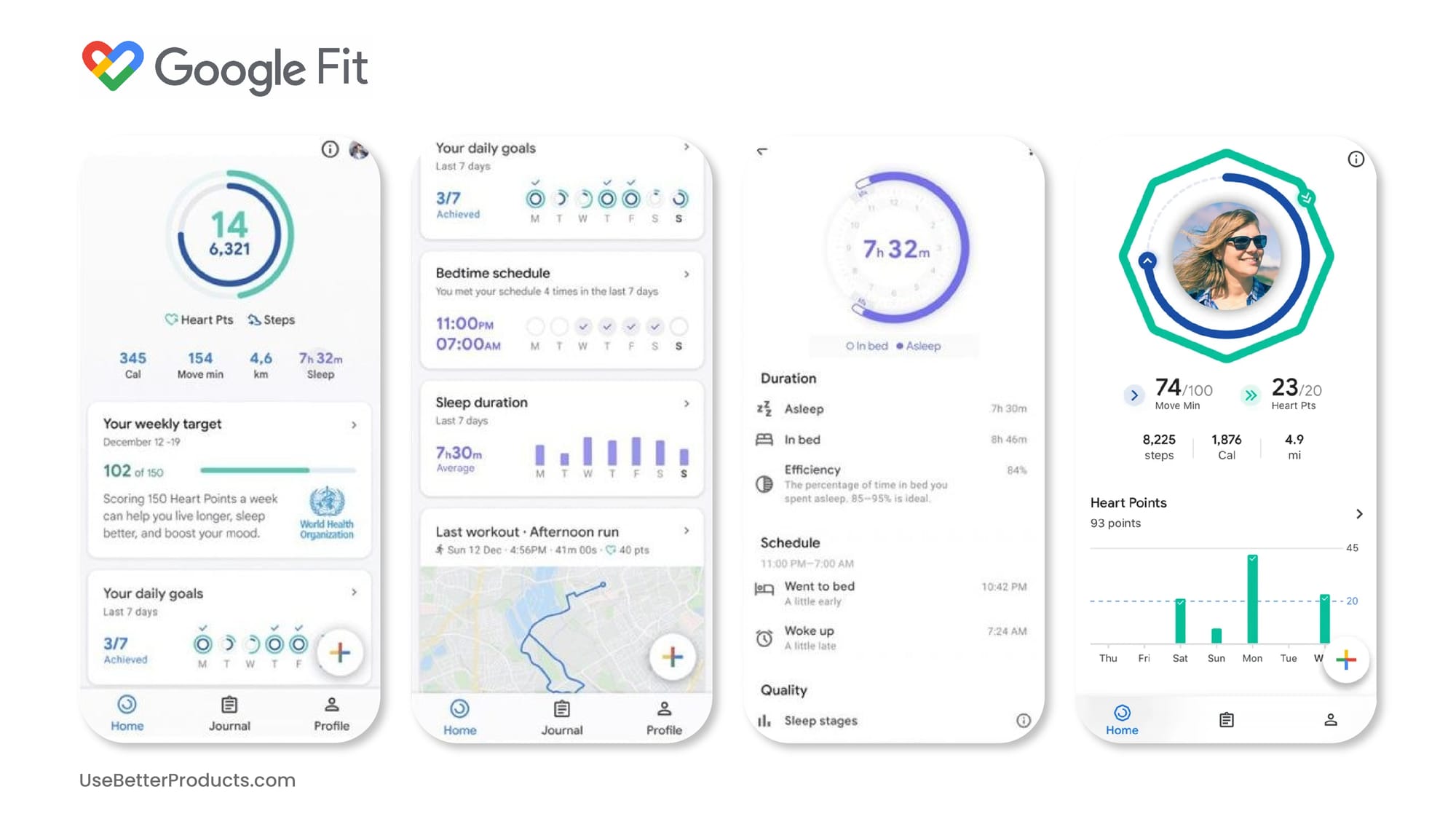
Google Fit by Google, offers a straightforward yet powerful solution for tracking your health and fitness. Designed to work seamlessly with Android devices and Wear OS smartwatches, Google Fit provides you with valuable insights into your daily movement and overall well-being. The app focuses on two key metrics: Move Minutes, which tracks active time, and Heart Points, which measure the intensity of activities, encouraging you to engage in heart-healthy exercise.
Key product offerings include integration with a variety of fitness apps and devices, enabling you to consolidate your health data in one convenient place. Google Fit’s collaboration with the American Heart Association ensures that its metrics are rooted in medical research, promoting activities that benefit cardiovascular health. The app’s clean, user-friendly interface makes it easy to set goals, track progress, and stay motivated.
Pros
In-Depth Activity Tracking:
- Key Metrics: Google Fit focuses on Move Minutes and Heart Points, which encourage you to participate in exercises.
- Diverse Activity Support: The app tracks a wide range of activities, from walking and running to yoga and strength training.
Integration with Other Apps and Devices:
- Seamless Syncing: Google Fit integrates with various fitness apps and devices, including Wear OS smartwatches.
- Third-Party Compatibility: The app works well with popular third-party fitness apps like Strava, MyFitnessPal, and Runkeeper.
User-Friendly Interface:
- Intuitive Design: The app features a user-friendly interface that makes it easy to set goals, track progress, and view insights into health metrics.
- Accessibility: Google Fit is easy to navigate, making it accessible for all fitness levels.
Cost-Effective:
- Free to Use: Google Fit is free to download and use, offering a range of health and fitness tracking features without any subscription fees.
Health Research Collaboration:
- American Heart Association: Google Fit’s metrics, developed with the American Heart Association, promote activities beneficial to cardiovascular health.
Cons
Limited Advanced Features:
- Basic Analytics: While Google Fit covers essential metrics, it may lack the detailed insights offered by competitor apps.
- No In-Depth Performance Analysis: Users seeking professional-level workout breakdowns might find Google Fit’s data somewhat basic.
Device Dependency:
- Best with Wear OS: The full potential of Google Fit is realized with Wear OS smartwatches, which may not appeal to everyone.
- Limited iOS Functionality: Although available on iOS, the app’s functionality and integration is better on Android devices.
Occasional Syncing Issues:
- Inconsistent Data Syncing: The reliability of the tracked data can be affected by occasional issues with data syncing between Google Fit and other apps or devices.
Price
Free to Use:
- No Subscription Required: Google Fit is entirely free to download and use, offering a wide range of health and fitness tracking features without any subscription fees.
Device Integration Costs:
- Wear OS Smartwatches: For real-time tracking and more advanced features, you may choose to invest in a Wear OS smartwatch, which starts at $100.
- Android Device Compatibility: Without an existing Android device, you might not realize the app’s full functionality.
Overall, Google Fit stands out as a versatile and user-friendly fitness tracking app, particularly excelling when you’re in the Android ecosystem. Its focus on key metrics like Move Minutes and Heart Points ensures you’re engaging in health-promoting activities. The app's ability to integrate seamlessly with various fitness devices and third-party apps enhances its functionality.
However, while Google Fit offers solid basic tracking, it may lack the advanced analytics sought by serious enthusiasts. Additionally, its full potential is best realized with Wear OS smartwatches, which might limit its appeal to those using other brands or iOS devices. Despite these considerations, Google Fit’s cost-effectiveness, ease of use, and broad compatibility make it a highly attractive option.
Apple Health App Review
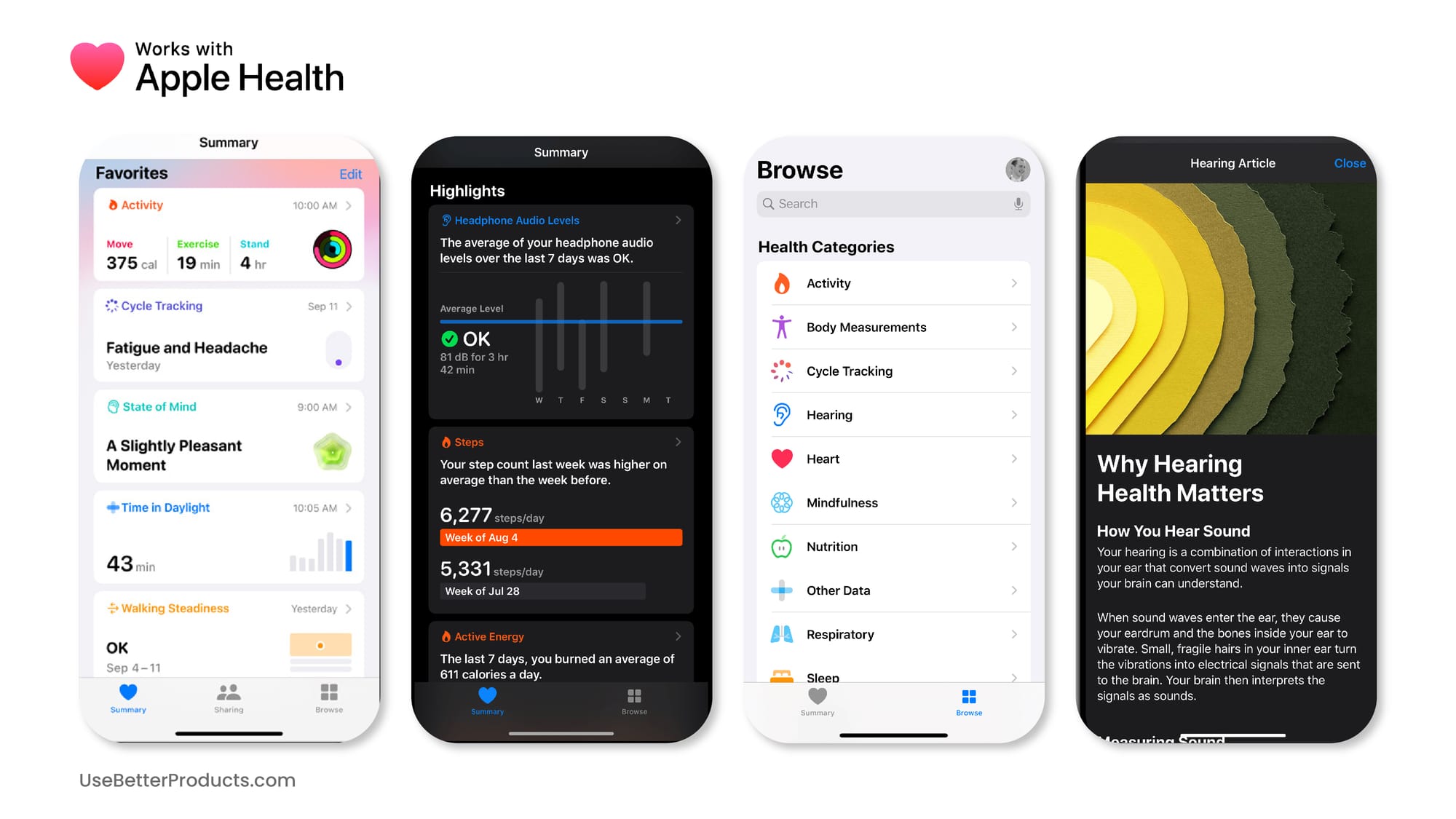
Apple Health, a cornerstone of Apple's health and fitness ecosystem, offers a well-rounded platform that seamlessly integrates with the iPhone and Apple Watch. Apple Health consolidates health data from various apps and devices into a single interface. It tracks a broad spectrum of metrics, including activity levels, heart rate, sleep patterns, and even mindfulness minutes.
The Health app itself provides detailed summaries and trends, while the Apple Watch enhances the experience with real-time biometric tracking. Apple Health's standout feature is its ability to sync with a multitude of third-party apps and devices, allowing you to centralize all your health information in one place. Apple Health is a powerful ally for anyone looking to take a data-driven approach to their health and fitness journey.
Pros
Detailed Health Tracking:
- Wide Range of Metrics: Apple Health tracks various health metrics, from sleep and activity levels to nutrition and mindfulness.
- Centralized Data: The app consolidates data from multiple sources, including third-party apps and devices, into one easy-to-monitor interface.
Integration with Apple Devices:
- Seamless Syncing: It integrates seamlessly with the iPhone and Apple Watch for accurate tracking.
- Enhanced Functionality: Deep integration with Apple’s ecosystem enhances the app’s functionality.
User-Friendly Interface:
- Intuitive Design: The app features a clean interface that makes it easy to navigate and understand health data.
- Customizable Dashboard: You can personalize the dashboard to ensure the most relevant information is always at hand.
Privacy and Security:
- Data Privacy: Apple places a strong emphasis on privacy, ensuring that your health data is only accessible to you.
- Control Over Data: You have control over which apps and devices can access their health data.
Cons
Limited to Apple Ecosystem:
- Device Dependency: Full functionality is best realized with Apple devices.
- Compatibility Issues: Some features may be limited or unavailable on non-Apple devices.
Basic Analytics:
- Advanced Insights: While detailed, Apple Health’s analytics might not be as advanced as in specialized fitness tracking apps.
- Data Depth: If you’re seeking in-depth performance analytics, the app’s data analysis might feel basic.
Subscription Costs for Additional Features:
- Apple Fitness+: Access to advanced workout programs and guided fitness sessions requires a subscription to Apple Fitness+.
Complexity for Beginners:
- Learning Curve: The extensive range of features and integrations might be overwhelming for beginners.
Price
Free to Use:
- Core Features: Apple Health is free to download and use.
Apple Fitness+:
- Advanced Workouts and Programs: Apple Fitness+ subscription costs $9.99 per month or $79.99 per year. It offers guided fitness sessions and advanced workout programs.
Device Integration Costs:
- Apple Watch: To fully leverage Apple Health’s capabilities, you may need to invest in an Apple Watch, which starts at $199.
- iPhone Compatibility: The health app requires an iPhone/iPad for setup. This can be an additional cost for users without an existing Apple device.
Apple Health stands out as the fitness tracking app of choice if you’re already invested in the Apple ecosystem. Its detailed health-tracking capabilities, seamless integration with the iPhone and Apple Watch, and centralized data from various third-party apps make it a versatile tool for monitoring overall well-being. The customizable dashboard enhances the user experience, while Apple’s strong emphasis on privacy ensures that your health data remains protected.
Despite the above, the app's full potential is best realized with Apple devices, which may limit its appeal if you prefer other brands. While it offers extensive tracking features, some advanced analytics available in specialized fitness apps might be lacking. On the other hand, Apple Health remains a valuable option if you’re seeking an integrated approach to health and fitness tracking.
Overall Conclusion
In the ever-evolving landscape of fitness technology, there's an app—or a device—for every kind of fitness enthusiast. Whether you're drawn to Fitbit's comprehensive health tracking and vibrant community features, Strava's detailed activity analytics and competitive social network, or the Oura Ring and WHOOP's deep focus on recovery and sleep optimization, the options are plentiful. Samsung Health and Google Fit offer versatile and cost-effective solutions with seamless integration into their respective ecosystems, while Apple Health provides a unified platform for health data with a strong emphasis on privacy within the Apple universe.
Ultimately, the best fitness app for you hinges on your individual goals, preferred activities, and the devices you already use. Consider what's most important to your fitness journey—be it advanced performance metrics, community engagement, personalized coaching, or simply ease of use. By aligning your needs with the strengths of these top fitness apps, you can transform your smartphone or wearable into a powerful ally on your path to better health. So take the leap, choose the app that resonates with you, and start unlocking your full fitness potential today.


